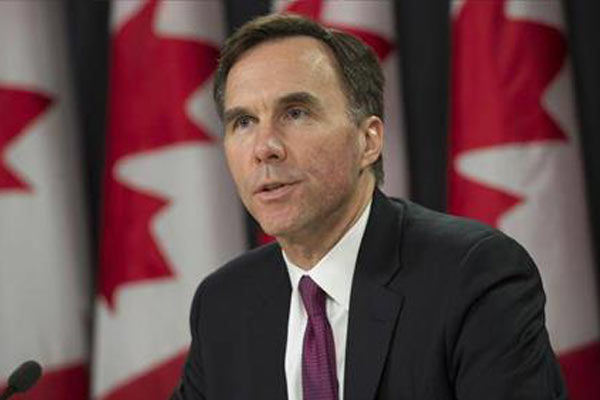My Real Estate Blog - Market Trends, Tips & Updates
Bill Morneau says government not planning to raise rate on capital gains
3/24/2017 | Posted in Real Estate Investments by Paul DeAdder | Back to Main Blog Page

Finance Minister Bill Morneau says he wants to move quickly this year with tax changes focused on high-income Canadians, but raising the rate on capital gains is not part of the government’s plans.
In an interview with The Globe and Mail in his Parliament Hill office Thursday, Mr. Morneau expressed concern with the continuing speculation about whether Ottawa will raise the inclusion rate on capital gains.
“Those were not in our budget and those are not key areas of focus,” he said.
Mr. Morneau’s second budget on Wednesday revealed that the government will release a policy paper in the coming weeks that will outline the department’s latest plans for tax changes. They will be focused on measures to curb the ability of individuals to create corporate structures that are not active businesses but rather a vehicle for paying less tax.
Only 50 per cent of a capital gain – such as the profit from selling stocks or an investment property – is currently subject to tax. Mr. Morneau’s broad review of tax credits announced last year led to months of speculation that the inclusion rate could be increased to 66 per cent or 75 per cent.
Throughout that review, Mr. Morneau never said that such a change was under consideration, nor did he clearly rule it out. He expressed concern Thursday that the issue continues to be discussed even though it was not mentioned in the budget.“I don’t want people speculating on tax. It’s most appropriate for me to say: We didn’t put something in our budget and there’s no value in speculating on tax measures,” he said. “What we’ve said is we’ve put in our budget things that we wanted to focus on and we’ve talked about things that we want to move forward on a consultation paper on, and by not talking about those things [capital-gains tax-rate changes], we’re not talking about them … I think it’s clear enough that we didn’t put it in the budget after all that speculation.”
The decision not to announce major tax changes in the budget was largely viewed as an acknowledgment by the Liberals that it would be better to wait and see how tax-reform promises materialize in the United States. Mr. Morneau declined to make that link Thursday. He said the tax changes will move quickly this year, but that it was too early to say whether they would be ready in time for his fall fiscal update.
“Clearly, with the tax system, it’s important to do things in an expeditious fashion,” he said.
The minister insists this year’s tax review is not aimed at legitimate small businesses, but Canadian Federation of Independent Business president Dan Kelly said tens of thousands of family businesses will be concerned that they could potentially lose the ability to split their income for tax purposes.
“That was one of CFIB’s earlier victories in the 1970s was to allow business owners to benefit from having other family members involved, because most often it’s a mom-and-pop shop – mom and pop are working in the business and to limit that would be, I think, troubling to a lot of entrepreneurs,” he said.
Mr. Morneau will be in Toronto on Friday as he begins a cross-country tour to promote the budget.
Prime Minister Justin Trudeau, meanwhile, was accused of arrogance on Thursday by the opposition for choosing to skip Question Period on the day after the budget. Mr. Trudeau appeared instead at an event at Toronto’s George Brown College before a stop in the riding of Markham-Thornhill, where voters will go to the polls April 3 for a by-election.
Speaking publicly for the first time since the release of Wednesday’s budget, Mr. Trudeau fielded several questions from reporters about why the budget makes no mention of when the books will be balanced.
“In the last election, Canadians made a very clear choice between two parties that were focused on balancing the budget at all costs, or the Liberals, who said it’s time to invest in our future,” he said. “That’s what this budget does. I will make no apologies for that because I’m proud of the investments we’re making in Canadians and in our future.”
The Liberal Party promised in 2015 to keep deficits under $10-billion a year and to balance the books by 2019.
The budget projects this year’s deficit will be $23-billion, followed by a $28.5-billion deficit the following year. The government estimates the size of the deficit will decline to $18.8-billion in 2021-22. The Liberals now prefer to use the debt-to-GDP ratio as their fiscal guide, but by that measure, the government has no room for new spending over the next five years.
RBC chief economist Craig Wright said Ottawa should set clear targets for balanced budgets because the debt-to-GDP ratio can fluctuate considerably in the event that inflation rises or the economy struggles.
“We’re arguably closer to the next recession than the last recession and if you get any upside surprise on interest rates and/or downside surprise on growth, that math changes pretty quick and that’s the worry,” he said. “We’ll be heading into the next challenge with a fiscal situation that doesn’t leave us much room to respond.”
Source: The Globe and Mail

